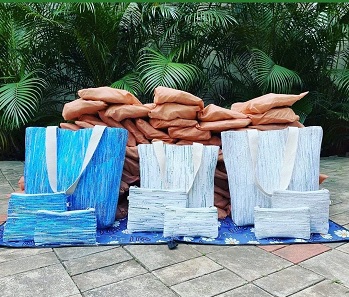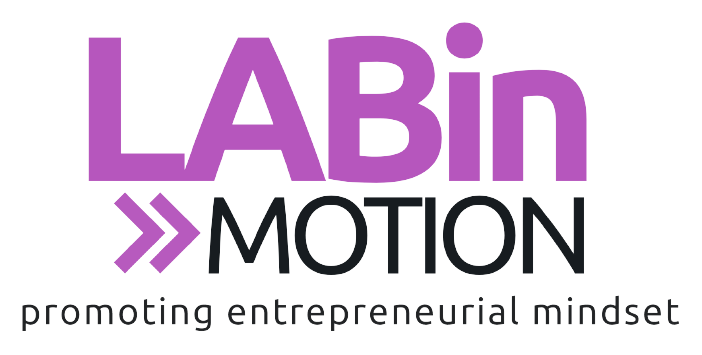One of the biggest environmental threats today, the malaise of plastic pollution grew worse during the Covid-19 pandemic with a significant increase in use of single-use plastics. According to reports, India generates approximately 9.4 million tonnes plastic waste yearly – or 26,000 tonnes per day, and out of this approximately 5.6 million tonnes is recycled (15,600 tonnes per day), while 3.8 million tonnes (9,400 tonnes per day) remains as litter. But there are people seeking to deal with this alarming state of affairs in their own innovative ways.
With an aim to resolve waste management, especially that of non-biodegradable and difficult-to-recycle waste plastic, Pune-based Nandan Bhat founded EcoKaari in September 2020. The social enterprise startup works towards a sustainable world by “upcycling” discarded non-biodegradable and difficult-to-recycle plastic bags, grocery bags, multi-layered wrappers of cookies, chips, glittery gifts wraps and old audio and video cassette tapes.
“A startup like ours is trying to conserve the environment and enable craft-based opportunities to individuals from humble backgrounds. We saw the ever-growing yet often ignored problem of waste plastic and tried to solve it using a means which will not harm the environment further. EcoKaari was born from an ardent desire to create a community where the bottom-up development is the key to achieve better living for all beings in a sustainable way,” Bhat says.
He also stresses that their aim is not just recycling, which is turning waste into a reusable product, though of lower quality, but upcyling, which seeks to turns waste into a material or product that is of a higher quality. “You do not need to send items to a recycling centre to be broken down if you want to upcycle. Instead, you just have to use your creativity to figure out new ways to repurpose or fashion items,” he says.
Sustainable Fashion
EcoKaari’s upcycling process is fascinating as they use a traditional charkha (spindle) and handloom to weave fabric from waste plastic. “Our weaving is entirely manual, so that we enable craft-based livelihood opportunities for rural women and youth. This upcycled handwoven fabric is then used to make handcrafted daily utility items such as handbags and fashion accessories, home decor and office stationery products. Also, our process is green as we use no heat, electricity or chemicals during the upcycling process,” Bhat says.
Bhat says that they need to upcycle anywhere from 7 to 50 plastic bags per upcycled handwoven bag depending on its product.
Empowering Communities
A social enterprise, EcoKaari was founded on the belief that development can only be sustainable if it is bottom-up, or that it is possible only when it begins at the grassroots levels and involves an empathetic understanding of the other biotic and abiotic communities. Bhat says they are committed to giving back to the communities where their weavers and artisans live and work, to bring a meaningful positive change through the startup’s empowerment programmes.

The revival of Indian heritage of making fabrics using charkha and handlooms doesn’t use any energy source, thus creating livelihoods opportunities for individuals from rural areas. “At present, we are supporting 15 artisans who belong to a humble background. With EcoKaari’s support, our artisans are financially independent and support either their education or family or both. We are also creating an alternative earning channels for waste pickers by purchasing waste plastic from them which in the market makes them nothing as compared to other high selling waste such as bottles, cardboard boxes etc,” Bhat says.
“Our Mission is to encourage individuals from under privileged backgrounds to learn and acquire new skills; allowing them to earn from their initiative. It’s time we connect again with our roots and create a larger canvas for all the beautiful and supreme creativity that our artisans of India have displayed for generations,” he adds.
The startup team also regularly organises dialogues with targeted groups at an individual, community and corporate level via workshops, as well as seminars on waste disposal.
The Craftpreneur’s Journey
Bhat has been a successful Craftpreneur for a decade now. Completing his BE Production from Mumbai University and a Masters in Sales and Marketing from Pune University, he worked for a decade in various corporates like SIFY, TATA, Big Bazaar, Sony India before taking a plunge in the entrepreneurial journey.
At his heart, he is an innovator and has been pivotal in starting and setting up the innovative process of upcycling waste plastic into sustainable fabric. An avid trekker, Bhat frequently went on treks with his friends, but one thing he always noticed was the plastic wrappers spoiling the scenic beauty as even waste pickers ignoring them as they brought no return due to the weight-volume ratio. He founded Ecokaari in September 2020 to deal with this aspect.
Bhat dreams of integrating various forms of Indigenous Indian Crafts with EcoKaari’s upcycled fabric, thus, giving new hope for a revival of crafts on the verge of extinction and now due to Covid19 struggle. He also co-founded Aarohana EcoSocial Developments in 2013 and from only two individuals in the company, Aarohana grew to a strong team of 30 employees.
Market Potentiality & Barriers
A startup is just growing a crop. You need to sow the seed, nurture it, give it the right set of conditions, and take good care of it, feels Bhat.
The startup has been getting good response. Citizens are fascinated that a plastic bag can also be magically transformed into beautiful products. Bhat says the demand is there but not a lot because they are competing with a market which produces machine-made products at very less prices as compared to their handmade – handcrafted product which takes an average about 2-3 days to make – from plastic sourcing to finished product.
“In 2019, the total international market for all bags and accessories was USD 90,915 million and USD 1,818 million for recycled/upcycled bags which is estimated only 2 per cent of the total. The market growth rate is 7 per cent per annum. Most handbag makers are our competition because of their polyurethane foam or other virgin polyester material which is readily available, machine-made and mouldable in any shape. Our work is restricted because of the material, have limitations in designer and is very labour intensive, thus higher prices work as a disadvantage,” Bhat says.
People assume that the products are made from waste plastic so they will cost very low or be given to customers for free without understanding the hard work it goes to create one product in 2-3 days, he notes.
Other challenges that the startup continues to face in its initial journey is attracting funding as compared to other causes like education and poverty among others, waste segregation which forms a massive part of the work that Ecokaari does. “If we receive any dirty plastic, then it is given to another organisation for safe disposal. Investment is high, and the outcome is low. We were in loss initially and still are especially now due to covid19,” says Bhat.





